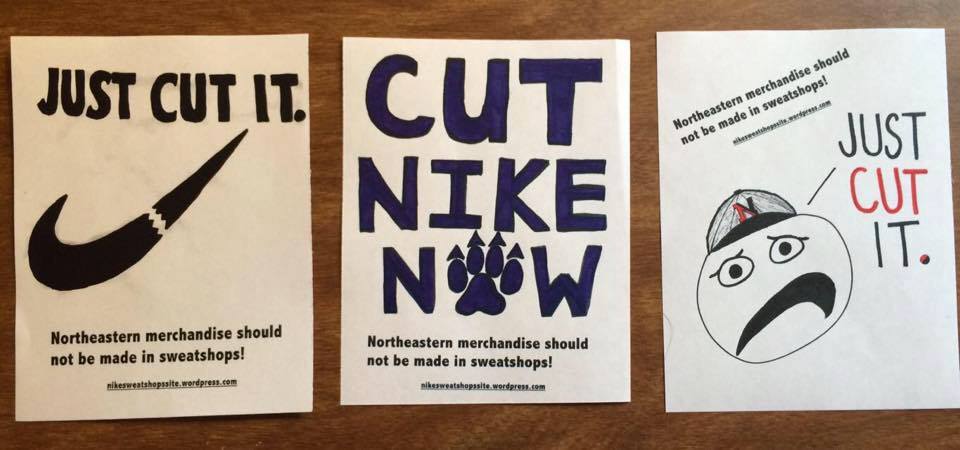Nike’s labor practices are a mess. Like other giant corporations obsessed with cheap labor, weak regulations and high profits, Nike has tolerated some of the worst worker abuses in history. Last year, when the Worker Rights Consortium (WRC) launched an investigation into a Vietnamese factory that produces Nike’s college apparel, Nike refused access to the independent monitors.
Nike has multiple sponsorship contracts with Northeastern sports teams, and our bookstore sells Nike products. As students in the Progressive Student Alliance (PSA), we believe that barring the WRC from inspecting its factories not only harms the rights of workers, but directly violates Northeastern’s Licensing Policy.
Northeastern’s policy is to only do business with vendors that “comply with fair labor standards” as defined by the WRC. (Here’s Northeastern’s Licensing Policy in full.) So when Nike stopped complying with the WRC, they also stopped complying with Northeastern policy. If the dining halls stopped serving food, Northeastern would not hesitate to find a new contractor. So why is our administration turning a blind eye to Nike’s malfeasance?
Sign the petition: CUT NIKE NOW
PSA first wrote to President Joseph E. Aoun regarding Nike’s conduct on April 5, 2016. When he failed to reply, we delivered a second letter on Sept. 23. In both of these letters, we reminded Northeastern of its Licensing Policy, which requires that “all products bearing Northeastern’s name are manufactured by socially and ethically responsible vendors.” We have demanded that Northeastern adhere to its licensing standards and put Nike on notice, giving the company 90 days to comply. If Nike does not allow the WRC full access to inspect its factories within this time, Northeastern should cut its contract with Nike.
Vice President of Student Affairs Madeleine Estabrook replied to our Sept. 23 letter. (We’re still waiting for her response to our Oct. 18 letter requesting a meeting.) While we appreciate the belated response, Estabrook’s letter failed to adequately address our concerns. Her main response was to let us know the WRC would be conducting “a joint inspection of the Hansae factory together with the Fair Labor Association (FLA) later this month.” While this may be true, it is no solution. The FLA was founded by some of the corporations it monitors, including (wait for it…) Nike.
“While the access Nike has now provided the WRC to Hansae allows us to proceed with our work at that factory, it does not resolve the underlying issue,” WRC Executive Director Scott Nova wrote in an email last month to a student at Appalachian State University. “Nike has made it clear that the company’s decision to facilitate access at Hansae sets no precedent and that Nike is making no commitment to facilitate access to any other factory in the future.”
Maybe Estabrook isn’t aware of this. And maybe she doesn’t know about the FLA’s ties to Nike. Perhaps she also missed the FLA giving a “perfect score” to Foxconn (which manufactures Apple products) after a 2012 investigation that uncovered employees working up to 11 consecutive days without breaks in a factory so polluted by dust they could hardly breathe. The FLA’s disastrous track record raises serious doubt as to the validity of a joint investigation into Hansae, and, furthermore, the conditions of other Nike factories. After conditions in Hansae are resolved and Nike is redeemed, what about their other factories?
According to Estabrook, “the WRC has not advised its members of any additional ongoing factory investigations involving Nike where [their] access was barred.” Her language here is severely misleading. While the WRC is currently focused on investigating Hansae, Nike has indicated that the WRC is unwelcome in all its collegiate apparel factories. But even if Estabrook were right, this response doesn’t address the issue: For Nike to shut the WRC out of even one factory is a violation of our licensing policy.
The WRC’s position as an independent monitor is a humanitarian necessity. Accusations against Nike in regard to exploitative labor practices have been going on since the 1970s. By 1998, Nike CEO Phil Knight even admitted that “the Nike product has become synonymous with slave wages, forced overtime, and arbitrary abuse.” This reputation is still well supported today. In 2011, Nike workers told Associated Press reporters that supervisors threw shoes at them, slapped them in the face, kicked them, scratched them and called them “dogs” and “pigs.” Nike has withheld overtime pay, severance and health benefits and in several instances failed to pay their workers even the minimum wage.
To document these abuses, and ultimately to force Nike to change its practices, requires the oversight of an independent monitor, one that is not tied to Nike or on its payroll. Without these monitors, we lose unbiased oversight, and without that, Nike cannot be held accountable.
Northeastern cannot continue to claim that “all products bearing Northeastern’s name are manufactured by socially and ethically responsible vendors that comply with fair labor standards” so long as it continues to work with a company that routinely violates those labor standards. Northeastern says the WRC “has not recommended that its members terminate their licenses with Nike.” However, this alone does not absolve Northeastern of its social responsibility. The university has a unique opportunity to proactively address a global challenge by putting Nike on notice and pushing for ethical labor standards.
– Progressive Student Alliance is a student group dedicated to promoting social and economic justice.
Photo courtesy Progressive Student Alliance.









